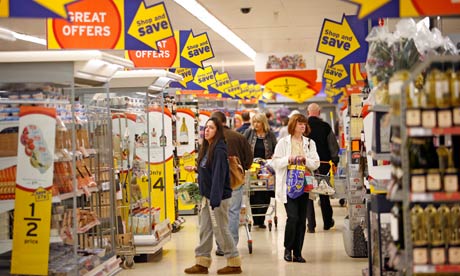Rising unemployment and job insecurity may have triggered calls for the chancellor, George Osborne, to find a plan B. But new research shows that the economic gloom has failed to permeate the higher echelons of the retail sector, with premium brand sales rocketing as upmarket supermarts' fine dining lines defy the downturn.
The research also suggests that the retail sector, especially food and drink, is becoming polarised, with budget brands also performing well.
Kantar Worldpanel, which tracks consumer behaviour through 30,000 UK households, says a sharp divergence in consumption patterns is taking place. In the past 12 months, strong sales at Aldi and Lidl, which are known for their discount brands, and the success of Waitrose suggest that both the bottom and top ends of the market are outperforming the centre.
"The recession may have led us to believe that we are all in it together, but the high street tells a different story," said Edward Garner, director at Kantar Worldpanel. "Two nations of shoppers have emerged within the grocery market.We only have to look at the strong performances of hard discounters Aldi and Lidl, who have seen a 9% year-on-year increase while, at the other end of the price scale, Waitrose has achieved growth of 8%." The combined growth rate of Aldi, Lidl and Waitrose last year was almost triple that of the big four supermarkets, suggesting shoppers are moving away from the middle ground.
Garner thinks that in times of austerity some shoppers switch to premium brands to compensate for cutting back elsewhere. "Sainsbury's, for example, has grown its own-label budget range by 10%. However, it has also increased sales of its premium label Taste the Difference range by 12%."
The "two nations" phenomenon is also seen in the alcohol market, with premium brands increasing in popularity. The UK's top five "world beer" brands – San Miguel, Peroni, Tuborg, Cobra and Tiger – have seen sales rise by 20.1% in the past year, despite total lager volume sales falling by 7%.The polarisation is exemplified by the performance of two well-known brands at opposite ends of the price spectrum. Rolls-Royce recently reported a 30% year-on-year jump in sales in the UK, while the 99p Stores high street chain has tripled its number of shops since the start of the economic downturn.
Further evidence is provided in the beauty market, with prestige brands showing rapid growth despite cutbacks in the standard part of the market. "Prestige skincare brands, such as Clarins, have grown by 9% year-on-year and prestige cosmetics by 7%," Garner said. Since the downturn women had shifted from a "complex personal care regime" to a simpler one.





